Perspectives on Classical Social and Political Thought
Citizens and Statesmen: A Study of Aristotles Politics
Mary P. Nichols, Fordham University
Love of Glory and the Common Good: Aspects of the Political
Thought of Thucydides
Michael Palmer, University of Maine
ROWMAN & LITTLEFIELD PUBLISHERS, INC.
Published in the United States of America
by Rowman & Littlefield Publishers, Inc.
4720 Boston Way. Lanham, MD 20706
Copyright 1992 by Rowman & Littlefield Publishers, Inc.
All rights reserved. No part of this publication may be reproduced, stored in a retrieval system, or transmitted in any form or by any means, electronic, mechanical, photocopying, recording, or otherwise, without the prior permission of the publisher.
British Cataloging in Publication Information Available
Library of Congress Cataloging-in-Publication Data
Palmer, Michael, 1952
Love and glory and the common good : aspects of the political thought of Thucydides Michael Palmer.
p. cm.
Includes bibliographical references (p. ) and index.
I. ThucydidesContributions in political science. I. Title.
JC71.T482P35 1992 320.092dc20 9144460 CIP
9781461639015
Printed in the United States of America
 The paper used in this publication meets the minimum requirements of American National Standard for Information SciencesPermanence of Paper for Printed Library Materials, ANSI Z39.481984.
The paper used in this publication meets the minimum requirements of American National Standard for Information SciencesPermanence of Paper for Printed Library Materials, ANSI Z39.481984.
To Adam and Andrea
Preface
This foray into the political thought of Thucydides is for those who are primarily interested in Thucydides, not the Thucydidean scholarship. I have thought it best to follow the dictum of G.F. Abbott, Students should take as their principal instructor in Thucydides Thucydides himself. Readers will find, for example, only cursory treatment of the so-called composition question that has been the focus of so much of the nineteenth- and twentieth-century secondary literature. The bibliography is not extensive, let alone comprehensive; it is selective: All the scholarship that I am aware of having influenced my understanding of Thucydides, directly or indirectly, positively or negatively, generally or only with regard to a specific passage in the narrative, is cited. But I have been neither willing nor able to pursue exhaustive bibliographic research, acknowledgment, and disputation. Thus, although the failure to cite a particular article, monograph, or book need not imply censure, I urge upon my readers the complaint and advice of Polybius to scholarly critics:
What is told they depreciate as insignificant or beside the purpose. What is omitted they demand as vital to the question, their object being to appear to know more than the writers. But a good critic should not judge a writer by what he leaves unsaid, but from what he says. If he detects misstatement in the latter, he may then feel certain that ignorance accounts for the former; but if what he says is accurate, his omissions ought to be attributed to deliberate judgment and not to ignorance.
Much that has been written on Thucydides is excellent. L.E. Lords suggestion that this large body of outstanding commentary reflects the quality of the original is perhaps sufficient explanation.
It will be obvious to informed readers, then, that this essay is indebted in many points, both general and particular, to Strausss interpretation of Thucydides. But it would be tedious for reader and author alike to document the myriad points of indebtedness. For the most part, then, I shall let this general acknowledgment suffice, and beg the scholiasts indulgence. In some other instances, too, where extensive citations would have become tedious, I have simply suggested that readers compare entire discussions of specific Thucydidean passages or themes with my own.
I have composed this essay for the spectrum of readers from beginning students of Thucydides to Thucydidean scholars. In view of this, where I have quoted Greek in this essay, I have transliterated it and not bothered with accents. Readers of the Greek language will never fail to discern the original; Greekless readers would be unable to in any case. Some of my paraphrases of Thucydidean passages follow the text so closely that they could pass for translations. In both paraphrasing and quoting Thucydides, I have had to make some decisions. Those who are familiar with Thucydides text will see that I have reasons for the constructions I have adopted; others will not be misled by me, at least not intentionally. However, except where I have thought it necessary to make a point about Thucydides political thought, I have not engaged in philological debate. On the few occasions where I thought it might be unfair to leave the Greekless reader in the dark, I have shed the requisite light.
Translations are my own, to this extent: they are an amalgam of various standard English translations, corrected by me against the Oxford Classical Texts edition of the Greek, with one exception, which is noted, where I depart from the Oxford text. Throughout this essay, I cite Thucydidean passages by the customary numbers: book. chapter. sentence number (where relevant).
The introduction that follows is directed more to the general reader than to the specialist; it is intended only to alert readers to my approach to reading Thucydides and the concerns and assumptions that underlie this study. The introduction should raise questions, not settle them, hence the interrogative mood. Specialists may object that the brush with which I paint my picture of Thucydidean studies is too broad. But the introduction is introductory: I ask generalists and specialists alike to reserve judgment on the essay until they have finished it, for were I without faith that both could learn something from it, I would not be placing it in the public realm.
Acknowledgments
Earlier versions of portions of this book were published in the Canadian Journal of Political Science, the American Political Science Review, Teaching Political Science, and the Review of Politics (see Bibliography for complete citations). Thanks to the respective editors for permission to publish revisions. Not everything in the original articles appears in this book; much in this book has never appeared before.
In financial support of my work on Thucydides, I have been the recipient of a Canada Council Doctoral Scholarship (197680), an Izaak Walton Killam Memorial Postdoctoral Scholarship (198083), a University of Maine Summer Faculty Research Grant (1985), an Earhart Foundation Summer Fellowship Research Grant (1986), and a John M. Olin Foundation Faculty Fellowship (198788). I have also had the opportunity to direct a summer seminar for school teachers on The Political Wisdom of Thucydides for the National Endowment for the Humanities (1990). I am especially grateful to the Earhart Foundation and the John M. Olin Foundation for their generosity.
For such understanding of Thucydides as I possess, I am indebted above all to Clifford Orwin and Christopher Bruell. The former guided my undergraduate study of Thucydides, the latter my graduate study. I believe I have consulted one or both at virtually every stage of my career, and they have always been patient in the face of my beleaguering inquiries. I have been blessed with these and other remarkable teachers: Walter Berns, Charles H. Fairbanks, Jr., Emil Fackenheim, Robert Faulkner, Ernest Fortin, David Lowenthal, Donald Maletz, and Robert Scigliano.

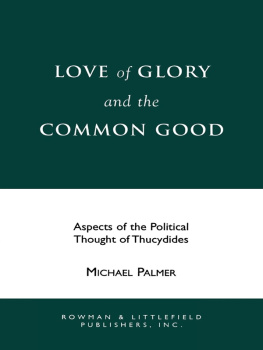






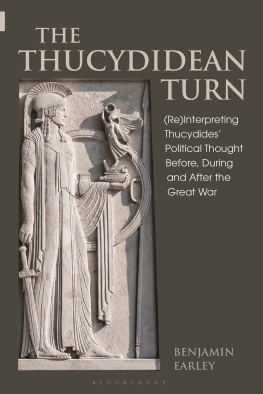

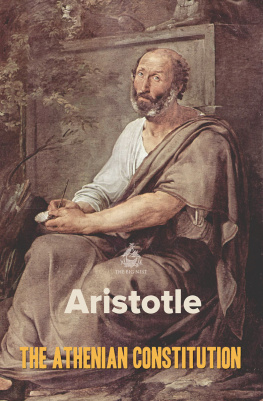
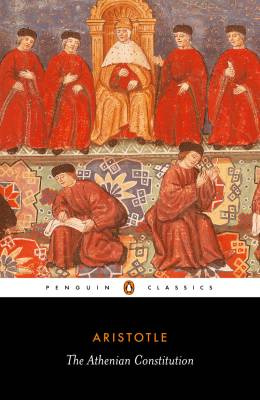
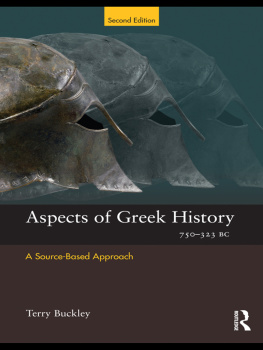
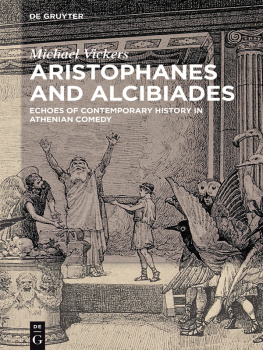
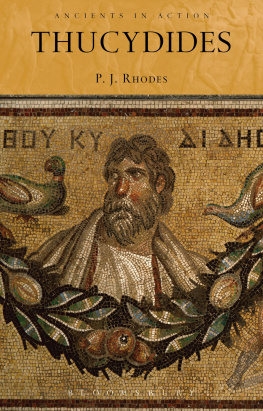
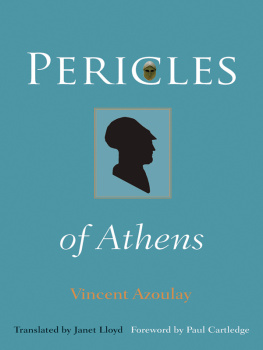
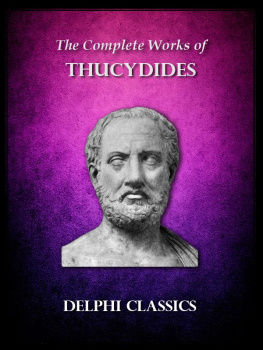
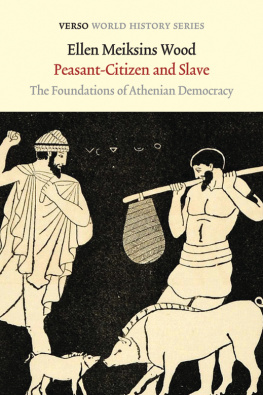
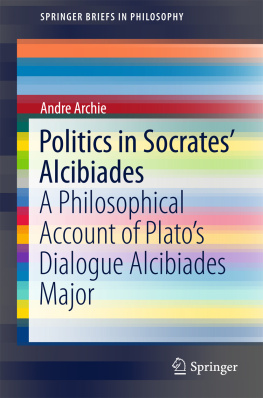
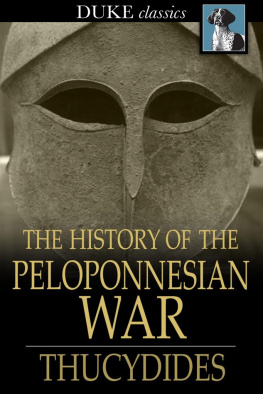
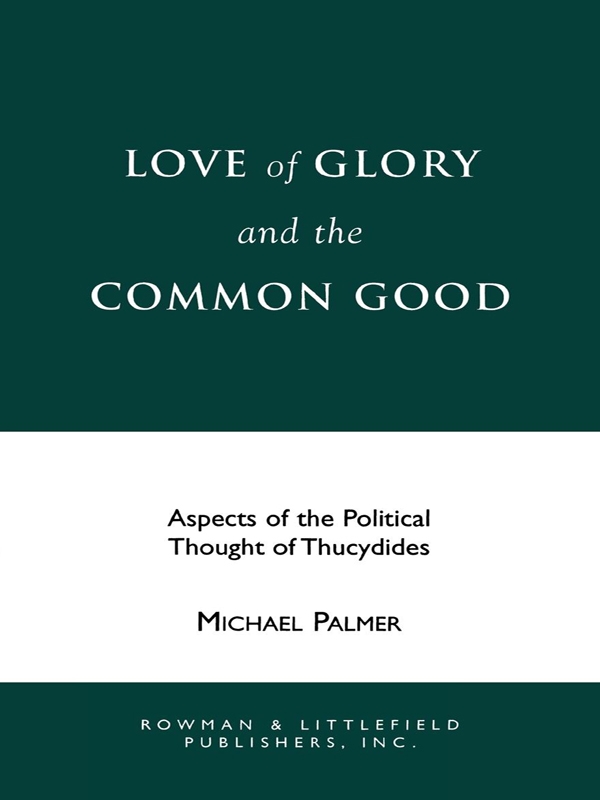
 The paper used in this publication meets the minimum requirements of American National Standard for Information SciencesPermanence of Paper for Printed Library Materials, ANSI Z39.481984.
The paper used in this publication meets the minimum requirements of American National Standard for Information SciencesPermanence of Paper for Printed Library Materials, ANSI Z39.481984.